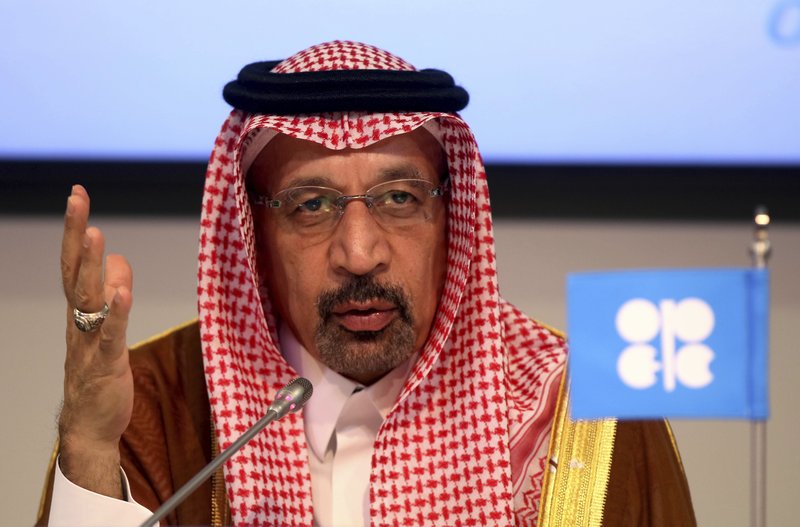DUBAI, United Arab Emirates -- Saudi Arabia's King Salman replaced the country's energy minister with one of his own sons Sunday, naming Prince Abdulaziz bin Salman to one of the most important positions in the country as oil prices remain below what is needed to keep up with government spending.
Born in 1960, the new energy minister is an older half-brother to 34-year-old Crown Prince Mohammed bin Salman. He replaces Khalid al-Falih, who'd been in the role since 2016.
Abdulaziz enters the job with a lifetime of experience in Saudi Arabia's energy sector. Leading the energy ministry, he will oversee production of one of the world's largest oil exporters. He has held senior roles in the energy ministry for more than three decades and most recently was minister of state for energy affairs.
Despite now getting the top role overseeing Saudi Arabia's energy portfolio, Abdulaziz is not known to be close to the crown prince.
His appointment marks the first time a Saudi prince from the ruling Al Saud family heads the important energy ministry.
The move comes as Brent crude oil trades under $60 a barrel, well below the range of $80 to $85 that analysts say is needed to balance the Saudi budget.
Al-Falih's position, from where he oversaw some 60% of the Saudi economy, had been diminished in recent days. It signaled a possible rift with the crown prince over his management of various issues, including reportedly moving too slowly in advancing Prince Mohammed's plan to sell shares in the state-owned oil company Aramco.
Al-Falih was removed just days ago from his post as board chairman of Aramco, a company that he once ran as chief executive. Al-Falih's Cabinet portfolio was also curtailed last month when mining and industry were spun off from his purview into a new ministry, in an attempt to focus on more effectively attracting foreign direct investment into these sectors.
Al-Falih's diminishing role had led to reports that he was out of favor with the crown prince, who is pushing to diversify the Saudi economy away from its dependence on oil revenue.
The crown prince has struggled to attract foreign investors, which analysts say are key to diversifying the economy and creating millions of jobs for young Saudis entering the workforce.
Foreign investors were spooked by the crown prince's purported anti-corruption crackdown in late 2017, where he oversaw the murky shakedown of senior royals and top Saudi businessmen detained in the Ritz-Carlton in Riyadh. Many have also shied away after the gruesome killing of Saudi critic and Washington Post columnist Jamal Khashoggi in the kingdom's consulate in Turkey last year by Saudi agents.
Still, there's great buzz around the crown prince's plan to list as much as 5% of Aramco by 2020 or 2021, which would make it the world's biggest initial public offering ever. Saudi Arabia has not said where an international listing would happen.
To prepare for an initial public offering, Aramco replaced al-Falih as board chairman last week with finance-minded Yasir al-Rumayyan, distancing the company from the energy ministry. Al-Rumayyan is a close adviser to the crown prince and heads the Public Investment Fund, the country's sovereign wealth fund.
Al-Falih, who'd taken over the energy portfolio from longtime oil minister Ali al-Naimi, was tasked with playing a key role in the crown prince's economic overhaul of the country. He expressed concern in January at an energy forum in Abu Dhabi over the "range of volatility" in oil prices seen over the past two to three years.
To keep oil prices from sliding even further, al-Falih led Saudi Arabia's curb on production in OPEC and the oil cartel's agreement with other major oil producers, like Russia, to cut production in past years. The major oil producers have agreed to curb production this year by 1.2 million barrels a day, with Saudi Arabia as the kingpin of the Organization of the Petroleum Exporting Countries, shouldering the bulk of the cartel's cuts.
As energy minister, al-Falih faced challenging market conditions, including a boom in U.S. shale production and global trade tensions that created an environment of lower oil prices.
"I think he did the most he could, and I think Prince Abdulaziz will probably do something very similar with the same kind of results," said Robin Mills, chief executive officer of Dubai-based energy consulting firm Qamar Energy.
Prince Abdulaziz is a known figure among OPEC members and industry insiders. In 1985, while in his 20s, he became an adviser to the Saudi energy ministry before being named deputy oil minister and assistant oil minister. In 2017, he was appointed minister of state for energy affairs.
A Section on 09/09/2019
